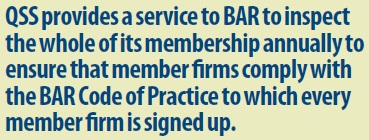Although there are other companies capable of auditing the ISO Standards, David believes that QSS is the best practical choice for auditing the full range of industry Standards and currently all BAR companies that hold BS EN 12522 have used QSS. “We are all removal people with direct experience on the ground,” he explained. “Other organisations can study the Standards, and audit to them, but sometimes it needs a little first-hand knowledge and common sense to appreciate the ways in which moving companies operate in practice.”
How they work
The principle behind all the Standards is the same: you work out procedures and processes to improve your service quality, set objectives, measure how you progress towards achieving them, analyse what went well and what didn’t and consequently work out ways of improving.

For example, it’s a base requirement of the BAR Code that a company contacts its customers to see how a job has gone. “But if you hold a Quality Standard you also need a procedure in place to address anything that went wrong and stop it happening again,” said David. “It doesn’t necessarily mean you are becoming a better company, but you do have a process in place to help you do so.” For this reason, once a company has one Standard, it often finds getting another relatively easy. In fact, there is some competition in the industry for companies to hold the most Standards. “The current record is 11,” said David.ou work out procedures and processes to improve your service quality, set objectives, measure how you progress towards achieving them, analyse what went well and what didn’t and consequently work out ways of improving.
The benefits of Standards
Standards benefit different companies in different ways. For some it’s a way of making sure that their processes are as efficient as possible to enhance their businesses and provide an early warning of where things might be going wrong. “It’s a bit like an annual MOT for your business,” said David.
For companies that want to tender for government or commercial contracts, they can open doors. “With many contracts, if you don’t have ISI 9001 you won’t get past stage one,” explained David.
Those companies who work in very competitive environments can often find that holding a Standard can give them a valuable differentiator to help their private customers choose in their favour.
For these companies the only objections are the cost and the amount of ongoing work necessary to make sure the business complies each year. But, as with all expenditure, the cost itself doesn’t matter: it’s what you get back that’s important. If having an industry or ISO Standard helps you to land one more contract a year, it’s probably paid for itself many times over. Similarly, if you can avoid making a mistake or damaging someone’s property by adopting good practices, it can save you money in the long term.
David said that there are some companies that might not benefit from holding Standards. A small company, serving a local community, with little competition and a loyal customer base might not find them as useful as others. But, should a company be sold at any time, holding recognised Standards could be attractive to a potential buyer. “It depends on the aspirations you have for your business,” said David.
Encouraging non-BAR companies
Currently QSS has over 240 companies certificated and they collectively hold 519 Standards between them. QSS hopes to get this up to 550 by the end of the year. Of the 240 companies, 22 are non-BAR companies and it is from this sector that David believes the company’s future growth will come. “There are many non-BAR companies around that essentially work to the BS EN 12522 Standard already but have never been assessed,” he explained. “We are hoping to increase interest in obtaining industry and ISO Standards with this group.” QSS will be attending The Movers and Storers Show in Manchester in November as part of its effort to do just that.
International auditing
QSS has also had some success in the international market. It is, for example, the approved supplier to EUROMOVERS and has travelled as far as Australia to provide companies with what they see as the ultimate service. David said that he is very happy to audit companies anywhere in the world but sometimes the expenses are prohibitive. The cost of the audit is fixed, but hotel bills and air fares knock the cost up significantly. “But the truth is, in many countries there may not be auditors who have experience in the moving business and can accurately and sympathetically audit a company for any of the industry Standards,” said David.
Could you be an auditor for QSS?
QSS does not make a profit, at least all profits are ploughed back into the business to enhance services. Although it is not run by BAR, QSS has its own Board of Directors and works from the BAR headquarters in Watford and so the rent it pays the BAR has the indirect effect of subsidising BAR members’ subscriptions. The aim is to grow the business but, to do so, it will need more auditors. As explained earlier in this article David believes that it’s important for auditors to have worked in the industry. “Working as an auditor for QSS would suit people who are looking to retire from the industry and use their skills and experience in a different way, maybe as part of a phased retirement,” said David.
Currently around 50% of BAR members hold an industry Standard. Some years ago BAR did seriously consider making the holding of an industry Standard mandatory for all members, but the membership voted against it. That day might still be some years away but the current adoption of Standards has shown that, for many, they have benefits. If you are interested in joining them, whether yours is a BAR company or not, contact QSS to find out more – David.woodhouse@bar.co.uk.
.jpg?sfvrsn=6f0a797a_2)
Photo: David Woodhouse